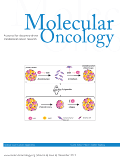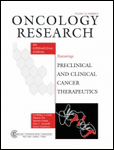
Cancer Cell International
Scope & Guideline
Unveiling Innovations in Cancer Biology
Introduction
Aims and Scopes
- Molecular Mechanisms of Cancer Progression:
Research articles often explore the intricate molecular pathways involved in cancer initiation and progression, including signaling pathways like Wnt/β-catenin, PI3K/AKT, and mTOR, which are critical for understanding tumor biology. - Role of Non-coding RNAs:
The journal frequently publishes studies on the regulatory roles of long non-coding RNAs (lncRNAs) and microRNAs in cancer, highlighting their potential as therapeutic targets and biomarkers for diagnosis and prognosis. - Tumor Microenvironment Interactions:
Research on the interactions between tumor cells and the tumor microenvironment, including cancer-associated fibroblasts and immune cells, is a significant focus, emphasizing the complexity of tumor biology and the potential for targeted therapies. - Therapeutic Strategies and Drug Resistance:
Papers often address novel therapeutic approaches, including immunotherapy and targeted therapies, as well as mechanisms of drug resistance, providing insights into improving treatment efficacy. - Clinical Implications and Biomarkers:
The journal emphasizes translational research that connects laboratory findings with clinical applications, aiming to identify novel biomarkers for cancer diagnosis, prognosis, and treatment response.
Trending and Emerging
- Immunotherapy and Immune Checkpoint Inhibition:
There is a rising trend in studies focusing on immunotherapy, including immune checkpoint inhibitors and CAR-T cell therapies, indicating a shift towards harnessing the immune system in cancer treatment. - Targeting the Tumor Microenvironment:
Research articles increasingly explore the role of the tumor microenvironment, highlighting the interactions between cancer cells and surrounding stromal and immune cells, which is critical for understanding tumor behavior and treatment response. - Metabolic Reprogramming in Cancer Cells:
Emerging research on how cancer cells reprogram their metabolism to support growth and survival is gaining traction, with a focus on metabolic pathways that could serve as therapeutic targets. - Application of Machine Learning and AI in Oncology:
The integration of machine learning and artificial intelligence in cancer research is on the rise, facilitating personalized medicine approaches and enhancing predictive modeling for treatment responses. - Circular RNAs and Novel Biomarkers:
There is an increasing focus on circular RNAs as potential biomarkers for cancer diagnosis and prognosis, reflecting a growing interest in non-coding RNA research.
Declining or Waning
- Traditional Chemotherapy Approaches:
There seems to be a declining emphasis on traditional chemotherapy methods as the primary focus shifts towards targeted therapies and immunotherapy, reflecting the broader trends in cancer treatment. - Single-agent Drug Studies:
Research focusing solely on the efficacy of single-agent drugs is becoming less common, with a growing preference for combination therapies that leverage synergistic effects. - Basic Cancer Biology without Clinical Relevance:
Studies that do not bridge the gap between basic cancer biology and clinical application are becoming less prevalent, as the journal aims to maintain relevance to clinical oncologists and researchers.
Similar Journals

Oncologie
Elevating oncology research to new heights.Oncologie is a distinguished academic journal published by WALTER DE GRUYTER GMBH, focusing on the dynamic and vital field of oncology. Established in 1999 and continuously published until 2024, this journal provides a platform for high-quality research and advancements in cancer treatment, prevention, and diagnosis. With an ISSN of 1292-3818 and an E-ISSN of 1765-2839, it is indexed in various databases, contributing to its growing visibility. Although categorized in the Q3 quartile for oncology research as of 2023, Oncologie offers essential insights and fosters scholarly dialogue among researchers, professionals, and students interested in oncology. Its unique contributions aim to bridge the gap between theoretical frameworks and clinical applications, making it a valuable resource for those seeking to advance their knowledge and expertise in cancer research.

Molecular Oncology
Pioneering Discoveries in Oncology and Genetics.Molecular Oncology, published by WILEY, is a premier open-access journal that has been at the forefront of cancer research since its inception in 2007. With an impressive impact factor reflective of its outstanding contribution to the field, it holds a prestigious position in the Q1 category across multiple disciplines, including Cancer Research, Genetics, and Molecular Medicine. This journal is essential for researchers and professionals seeking to publish high-quality findings in a rapidly evolving area of study, underscored by its significant Scopus rankings that place it within the top percentiles of Oncology and Molecular Biology. As an open-access journal since 2017, it ensures that vital research is readily available to a global audience, thereby facilitating collaboration and knowledge dissemination among academic and clinical communities. With its commitment to innovative and impactful research, Molecular Oncology continues to be a critical resource for advancing our understanding of cancer biology and treatment.

Cell Death Discovery
Illuminating the science behind cellular mortality.Cell Death Discovery, published by Springer Nature, is a distinguished open-access journal dedicated to advancing the field of cell death research. Since its inception in 2015, the journal has rapidly established itself as a premier platform for high-quality research, currently holding a remarkable position in the Q1 quartiles across multiple categories, including Cancer Research, Cell Biology, Cellular and Molecular Neuroscience, and Immunology. With an impact factor reflecting its significant contribution to the scientific community, Cell Death Discovery invites submissions that explore the molecular mechanisms of cell death and its implications across various biomedical fields. The journal's open-access model ensures that groundbreaking research is accessible to a global audience, facilitating collaboration and dissemination among researchers, professionals, and students alike. Located in the UK, at CAMPUS, 4 CRINAN ST, LONDON N1 9XW, ENGLAND, the journal continues to support innovative scholarship and foster a deeper understanding of the processes behind cell viability, development, and disease.

Molecular Cancer
Fostering collaboration for groundbreaking cancer research.Molecular Cancer, published by BMC, stands as a premier open access journal dedicated to advancing our understanding of cancer biology, treatment, and prevention since its inception in 2002. With an impressive Q1 ranking in the domains of Cancer Research, Molecular Medicine, and Oncology, this journal occupies a significant position in the academic landscape, emphasizing high-quality research that influences clinical practices and future studies. The journal is indexed in leading databases with exceptional Scopus ranks, reflecting its rigorous peer-review process and impactful contributions to the field, where it ranks in the top 2-3 positions across various relevant categories. Based in the United Kingdom, Molecular Cancer offers researchers worldwide a valuable platform for disseminating innovative findings that drive the biomedical community forward. The journal's open access model ensures that groundbreaking research is freely accessible, fostering collaboration and knowledge sharing among professionals, students, and academics alike. Explore cutting-edge developments in cancer research through Molecular Cancer and join a community committed to improving patient outcomes and advancing scientific discovery.

ONCOLOGY RESEARCH
Uncovering New Horizons in Cancer ScienceONCOLOGY RESEARCH, published by TECH SCIENCE PRESS, is a vital academic journal dedicated to the rapidly evolving field of oncology. With its ISSN 0965-0407 and E-ISSN 1555-3906, the journal serves as a key resource for researchers, clinicians, and academicians committed to advancing cancer research and treatment strategies. Operating without an Open Access model, ONCOLOGY RESEARCH provides high-quality, peer-reviewed articles that cover diverse topics within cancer research, medicine, and oncology, with its 2023 Scopus ranking placing it in the Q3 quartile. The journal's commitment to facilitating rigorous scientific discourse is evident in its historical breadth, with a publishing history dating back to 1992. ONCOLOGY RESEARCH is not only significant for the academic community but also plays a critical role in fostering new insights and approaches in the fight against cancer, making it a must-read for those involved in this critical area of study.

CELLULAR ONCOLOGY
Pioneering Open Access Discoveries in Cellular OncologyCELLULAR ONCOLOGY is an esteemed open access journal published by SPRINGER since 2004, specializing in the dynamic field of oncological research. With its ISSN 2211-3428 and E-ISSN 2211-3436, this journal plays a pivotal role in disseminating cutting-edge findings and innovative methodologies that address cancer at the cellular level. The journal has consistently achieved high-impact recognition, currently holding a Q2 rating in Cancer Research and Q1 rankings in Medicine (miscellaneous), Molecular Medicine, and Oncology as of 2023. Furthermore, it ranks 56th in oncology medicine and 48th in cancer research according to Scopus, placing it firmly within the top echelons of its field. Published in the Netherlands, with an aim to connect scientists, clinicians, and practitioners worldwide, CELLULAR ONCOLOGY fosters a collaborative environment for researchers to share insights, enhance understanding, and advance treatments. The journal’s open access model ensures that ground-breaking research is freely available, facilitating greater visibility and impact within the scientific community and beyond.

Non-coding RNA Research
Elevating the Dialogue on Non-Coding RNA InnovationsNon-coding RNA Research, published by KEAI PUBLISHING LTD, is a leading open-access journal dedicated to advancing the field of non-coding RNA, a critical component in the landscape of molecular biology and genetics. Established in 2016, this journal aims to provide a platform for the dissemination of high-quality research focusing on the roles, mechanisms, and therapeutic potentials of non-coding RNAs in various biological processes and diseases. With impressive Scopus rankings placing it in the top quartile for both Biochemistry and Medical Biochemistry, as well as notable standings in Genetics and Molecular Biology, Non-coding RNA Research continues to attract contributions from globally recognized experts. The journal's commitment to open access ensures broad visibility and engagement with cutting-edge discoveries, thereby fostering an inclusive scientific dialogue that enhances understanding and innovation in this rapidly evolving field. For researchers and scholars, the opportunity to publish in a Q1 ranked journal not only validates their work but also enhances its impact, making Non-coding RNA Research an indispensable resource for anyone interested in the intricate workings of non-coding RNA.

CELLULAR SIGNALLING
Illuminating Pathways in Biochemistry and GeneticsCELLULAR SIGNALLING, published by Elsevier Science Inc, is a premier journal within the realm of Cell Biology, boasting an impressive Q2 category ranking as of 2023. With an ISSN of 0898-6568 and an E-ISSN of 1873-3913, the journal has established itself as a critical platform for advancing the understanding of cellular mechanisms and signal transduction pathways since its inception in 1989. Covering a vast array of topics in Biochemistry, Genetics, and Molecular Biology, it ranks notably at 87 out of 285 in the Scopus list, placing it in the 69th percentile among its peers. The journal serves as an invaluable resource for researchers, professionals, and students seeking high-quality, impactful studies that drive forward the field of cellular biology. While it operates under traditional subscription access, its highlights include rigorous peer-reviewed articles, reviews, and insights that continue to shape current scientific discourse.

Molecular Therapy Oncolytics
Bridging Science and Therapy for Tomorrow's OncologyMolecular Therapy Oncolytics is an esteemed Open Access journal published by CELL PRESS, focusing on cutting-edge research in the fields of oncology, molecular medicine, and pharmacology. Established in 2014, the journal has quickly gained a prominent position in the academic community, reflected in its impressive Q1 and Q2 rankings across various categories including Cancer Research, Molecular Medicine, and Pharmacology. With an impactful presence in the UK and a strong international readership, it aims to disseminate significant advancements in therapeutic strategies targeted at cancer treatment and management. By providing a platform for peer-reviewed research, Molecular Therapy Oncolytics plays a critical role in bridging the gap between scientific innovation and clinical application, making it an invaluable resource for researchers, healthcare professionals, and students striving to contribute to the evolving landscape of oncology.

Journal of Cell Communication and Signaling
Transforming Understanding of Cellular CommunicationThe Journal of Cell Communication and Signaling is a prestigious academic journal published by Springer, focused on advancing the understanding of cellular communication mechanisms and signaling pathways. Since its inception in 2007, this journal has established itself as a leading platform in the field, with a strong impact reflected in its 2023 categorizations: Q1 in Biochemistry, Q2 in Cell Biology, and Q2 in Molecular Biology. Researchers from around the globe rely on its rigorous peer-reviewed articles to gain insights into the complex molecular dialogue that underpins various biological processes. With an ISSN of 1873-9601 and E-ISSN of 1873-961X, the journal is committed to disseminating high-quality research that informs both academic studies and practical applications in biotechnology and medicine. Although not an open access publication, it provides essential resources tailored for professionals, students, and researchers, enhancing their knowledge of critical signaling pathways that drive health and disease. The journal is located in the Netherlands, at VAN GODEWIJCKSTRAAT 30, DORDRECHT, and stands out in the field, boasting impressive ranks among its peers in the Scopus database.